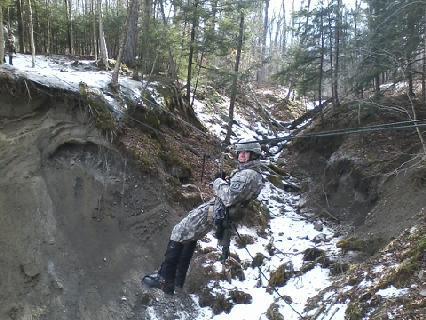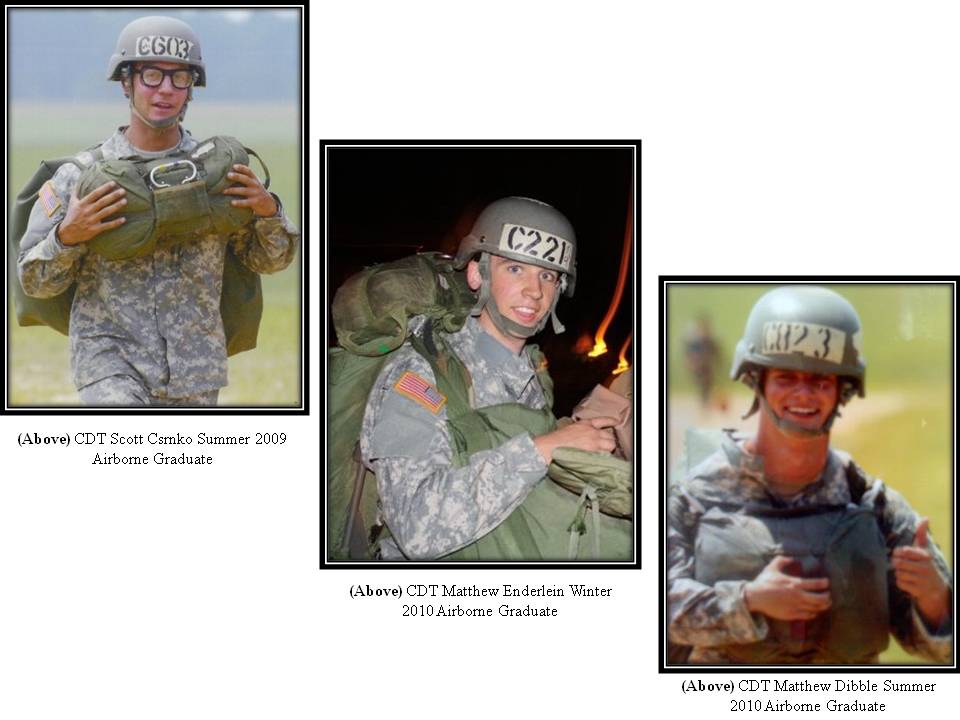Schools and Opportunities
Cadets may compete for training opportunities conducted at Active Army Schools. This training is usually conducted during the summer months but some allocations are available during the winter holidays. Cadets are selected to attend this training based on their overall standing within the program. Since the number of allocations is limited, selection for schools is competitive and based on factors including Order of Merit ranking, ROTC grades, academic grades, participation in ROTC activities, APFT scores and cadre recommendations.
Airborne School, Air Assault School, Mountain Warfare School, Sapper School
Airborne School (ABN)
Army paratrooper training is conducted for three weeks at Fort Benning, GA. Upon successful completion, cadets are awarded the Parachutist Badge. This training qualifies the Cadet to be a US Army Paratrooper.
Air Assault School (AA)
Cadets are trained in airmobile operations, including rappelling from helicopters, airmobile tactics and rigging air mobile cargo. This is a two-week course taught at Fort Campbell, KY or Fort Rucker, AL. Upon successful completion, the cadet is awarded the Air Assault Badge.
Mountain Warfare School (MW)
This course is taught at the Ethan Allen Firing Range in Jericho, VT. It is taught in two phases, each lasting two weeks. The summer phase teaches and tests Cadets on military mountaineering operations including rock climbing, rappelling, and orienteering. The winter phase teaches and tests on similar tasks but in the winter environment. It includes ice climbing, cross-country skiing, and cold weather operations. Upon successful completion, cadets are awarded the Ramshead Device, which presently can only be worn by certain National Guard soldiers.
Sapper Leader Course
The Sapper Leader Course is a 28-day course designed to train joint-service leaders in small unit tactics, leadership skills, and tactics required to perform as part of a combined arms team. The course is open to enlisted soldiers in the grades of E-4 (P) (in the Army, specialist on the list for promotion to sergeant, E-5) and above, cadets, and officers O-3 (Army, captain) and below. Students can come from any combat or combat support branch of the service, but priority is given to engineering, cavalry, and infantry soldiers.
Northern Warfare Training Course (NW)
This is a three-week course covering tactical operations in a cold weather climate. The course is taught at Fort Greeley, AK. Soldiers and cadets will be trained in winter survival techniques, skiing, snowshoeing and cold weather patrolling.
Cadet Troop Leadership Training (CTLT)
Cadet Troop Leadership Training is an optional program for MSIII cadets during the summer following completion of LDAC. This three week CONUS or 4 week OCONUS program trains Cadets in lieutenant positions with active Army and Reserve component units. Assignments are available in nearly all branches and with units worldwide.
Cadet Field Training (CFT)
This is a 4-week program of instruction executed by the United States Military Academy to develop the leadership skills of sophomore cadets. Seven weeks of CFT will be at Camp Buckner, with one week at Fort Knox, KY for Mounted Maneuver Training (MMT)(Cancelled in 2010). CFT consists of basic skill level training ending with Maneuver Light Training where the cadets train on how to defend and attack an opposing force.
The Cadet Intern Program (CIP)
An initiative of ASA/MRA, allows cadets to work with Department of the Army (DA), OCAR, NGB, and OSD for 3 weeks.



